Labour leadership hopeful Sir Keir Starmer has called for European Union nationals to be given the right to vote in the UK.
On the eve of Brexit day, Sir Keir said the treatment of around three million EU nationals since the 2016 referendum had been “shameful”.
Meanwhile, leadership rival Rebecca Long-Bailey received a further boost to her campaign to replace Jeremy Corbyn, picking up the support of the Communication Workers Union.
Download the new Independent Premium app
Sharing the full story, not just the headlines
EU citizens can only vote in local elections rather than Westminster contests, something Sir Keir said must change as he called for an end to Brexit divisions.
Writing in The Guardian ahead of a speech on Friday, he said: “The government should give all three million EU nationals living in the UK full voting rights in future elections.
“The way they have been treated over the past three years is shameful. We were never just ‘tolerating’ EU citizens living in this country – they are our neighbours, friends and families.”
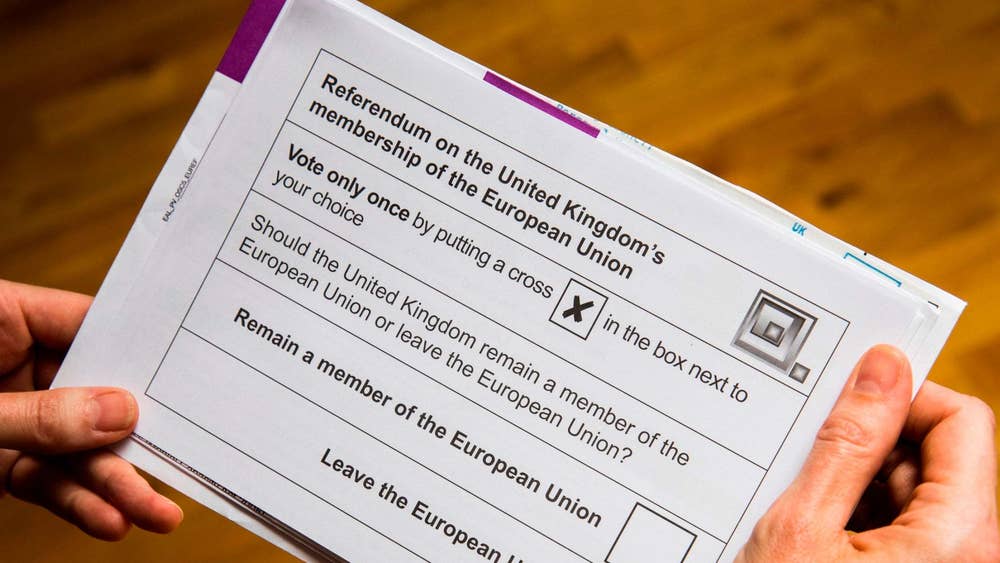
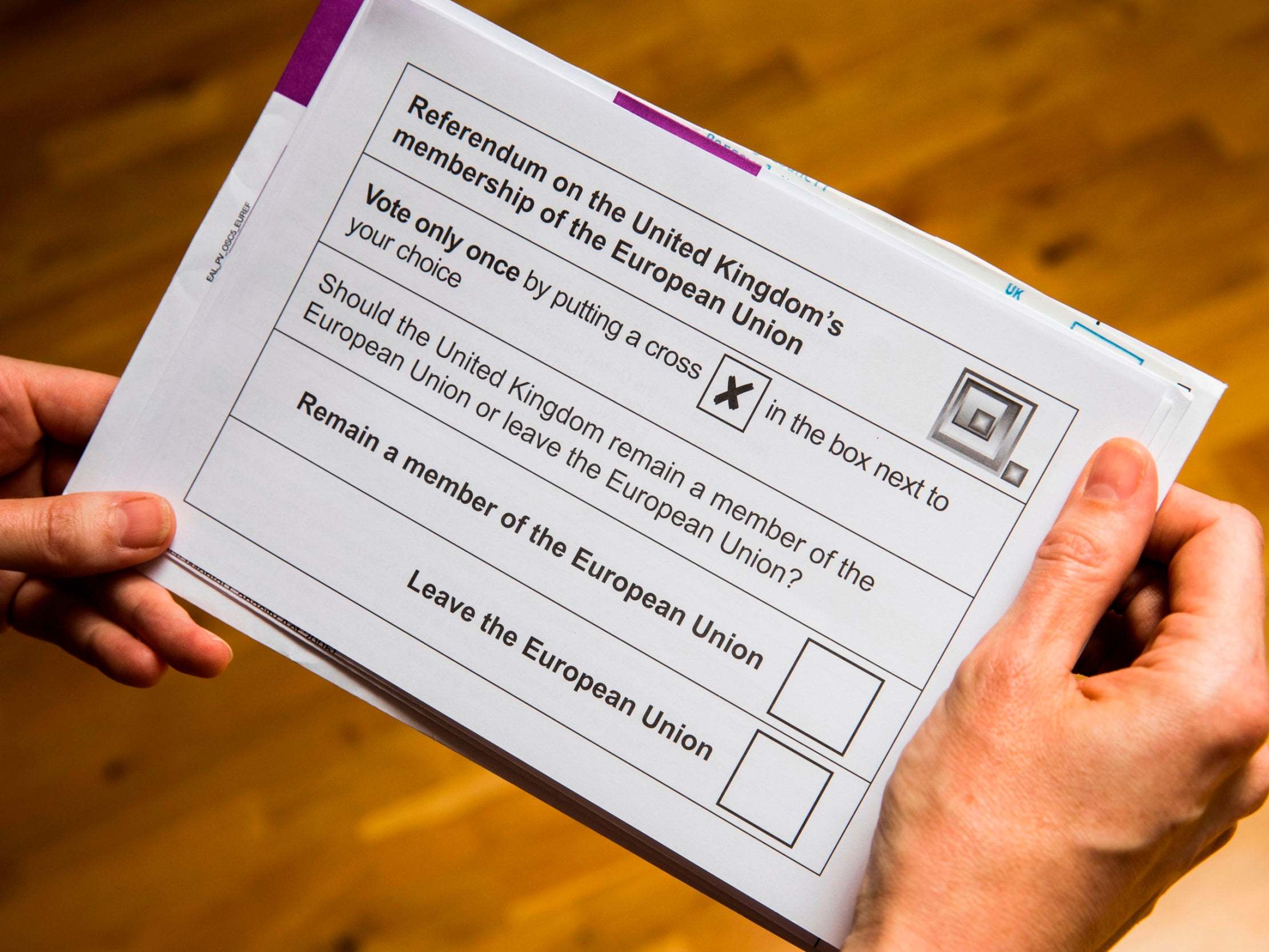
1/20 Britain votes to leave the European Union – 23 June 2016
A referendum is held on Britain’s membership of the European Union. Fifty-two per cent of the country votes in favour of leaving
AFP via Getty
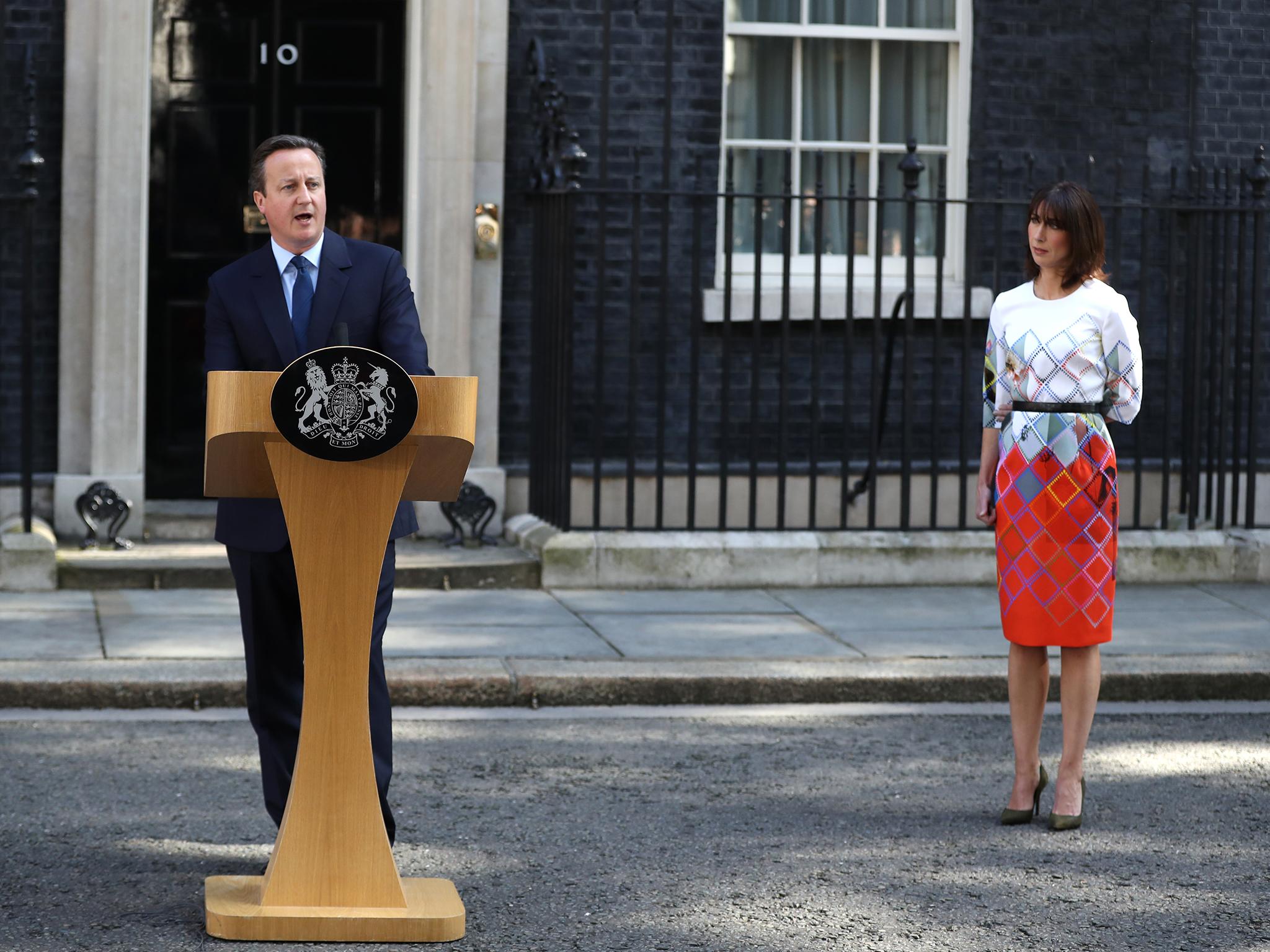
2/20 David Cameron resigns – 24 June 2016
David Cameron resigns on the morning of the result after leading the campaign for Britain to remain in the EU
Getty
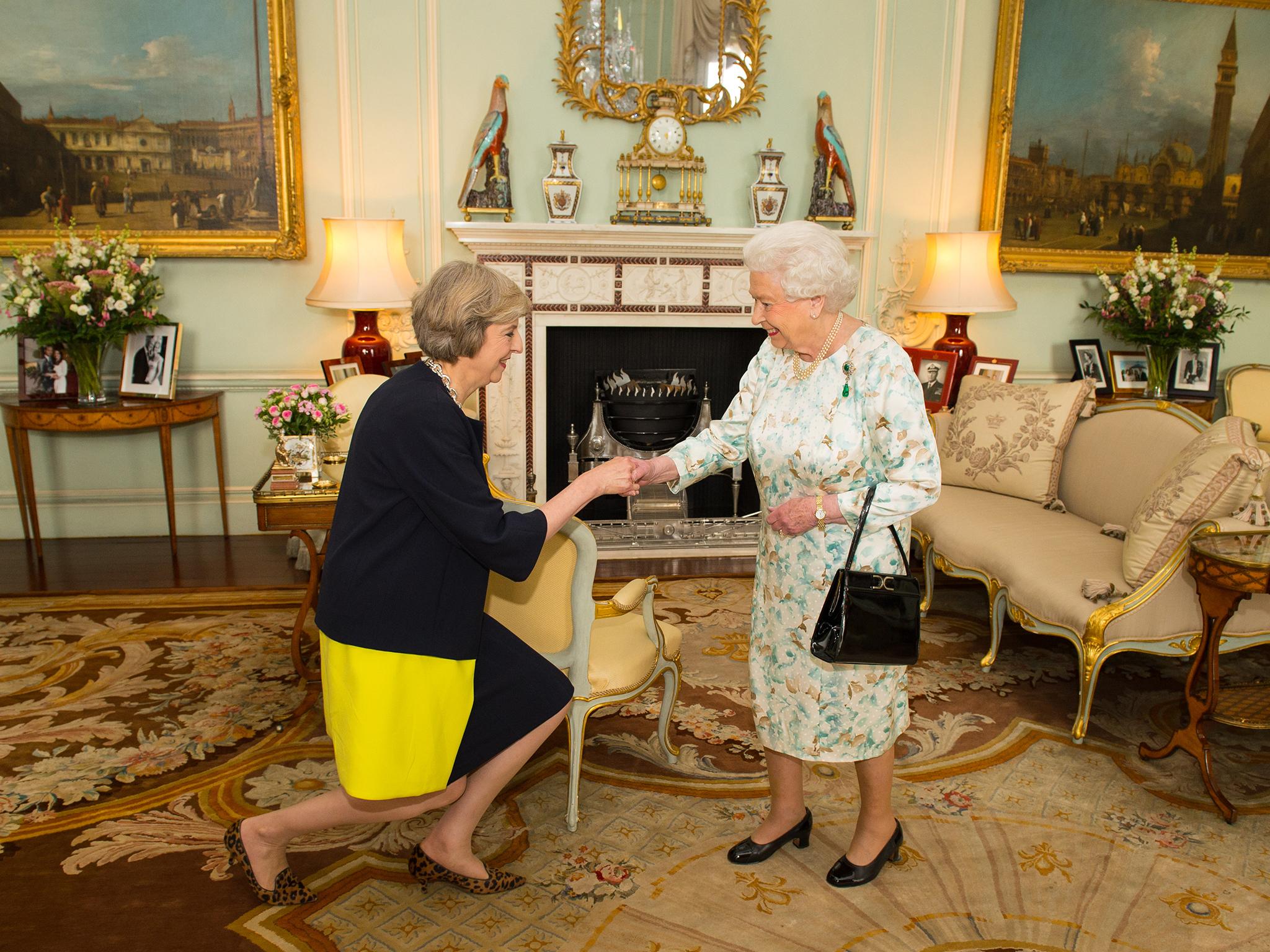
3/20 Theresa May takes the reins – 13 July 2016
Theresa May becomes leader of the Conservative party and prime minister, winning the leadership contest unopposed after Andrea Leadsom drops out
Getty
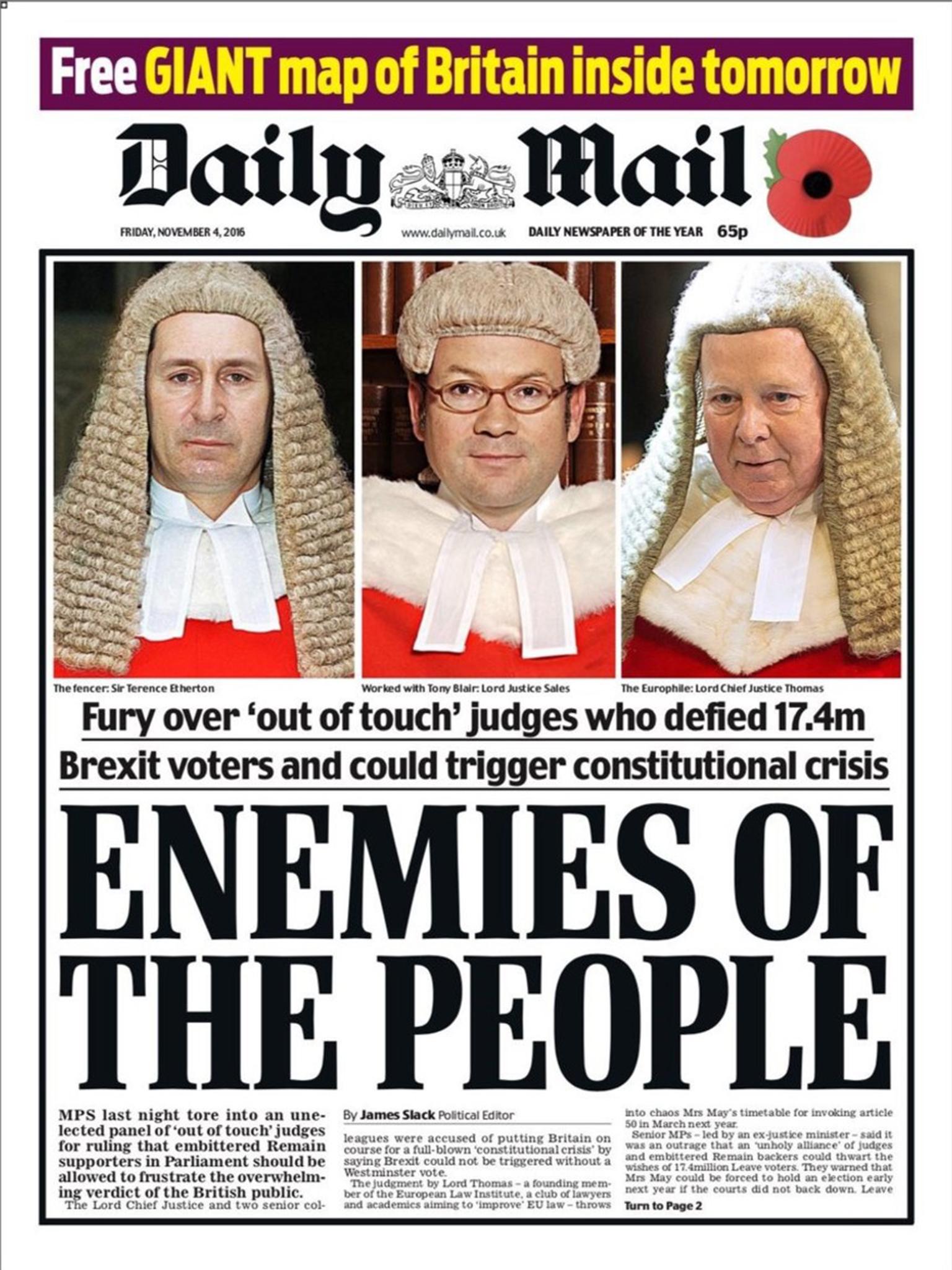
4/20 High Court rules parliament must vote on Brexit – November 2016 – 3 November 2016
The High Court rules that parliament must vote on triggering Article 50, which would begin the Brexit process
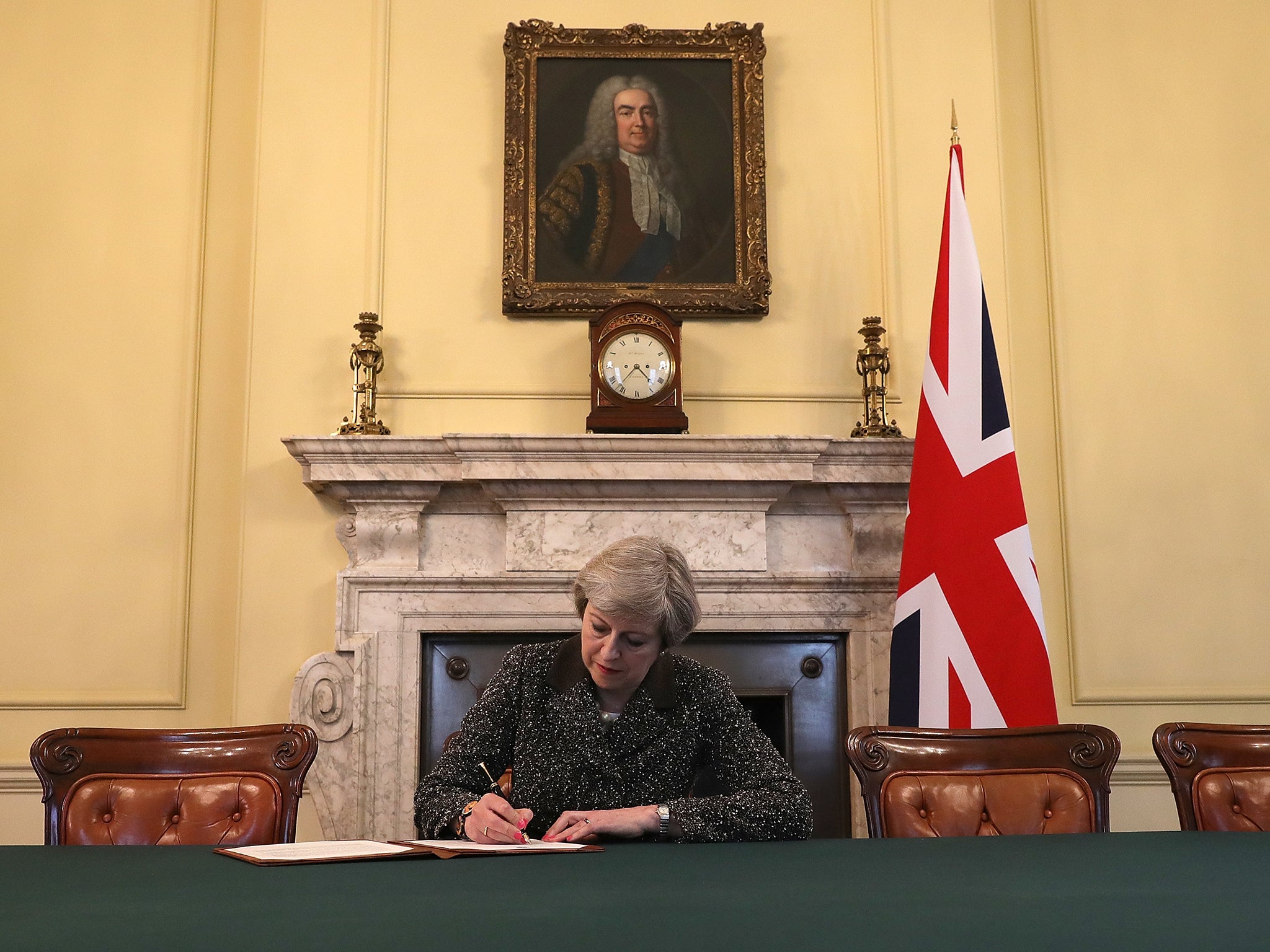
5/20 Article 50 triggered – 28 March 2017
The prime minister triggers Article 50 after parliament endorses the result of the referendum
Getty
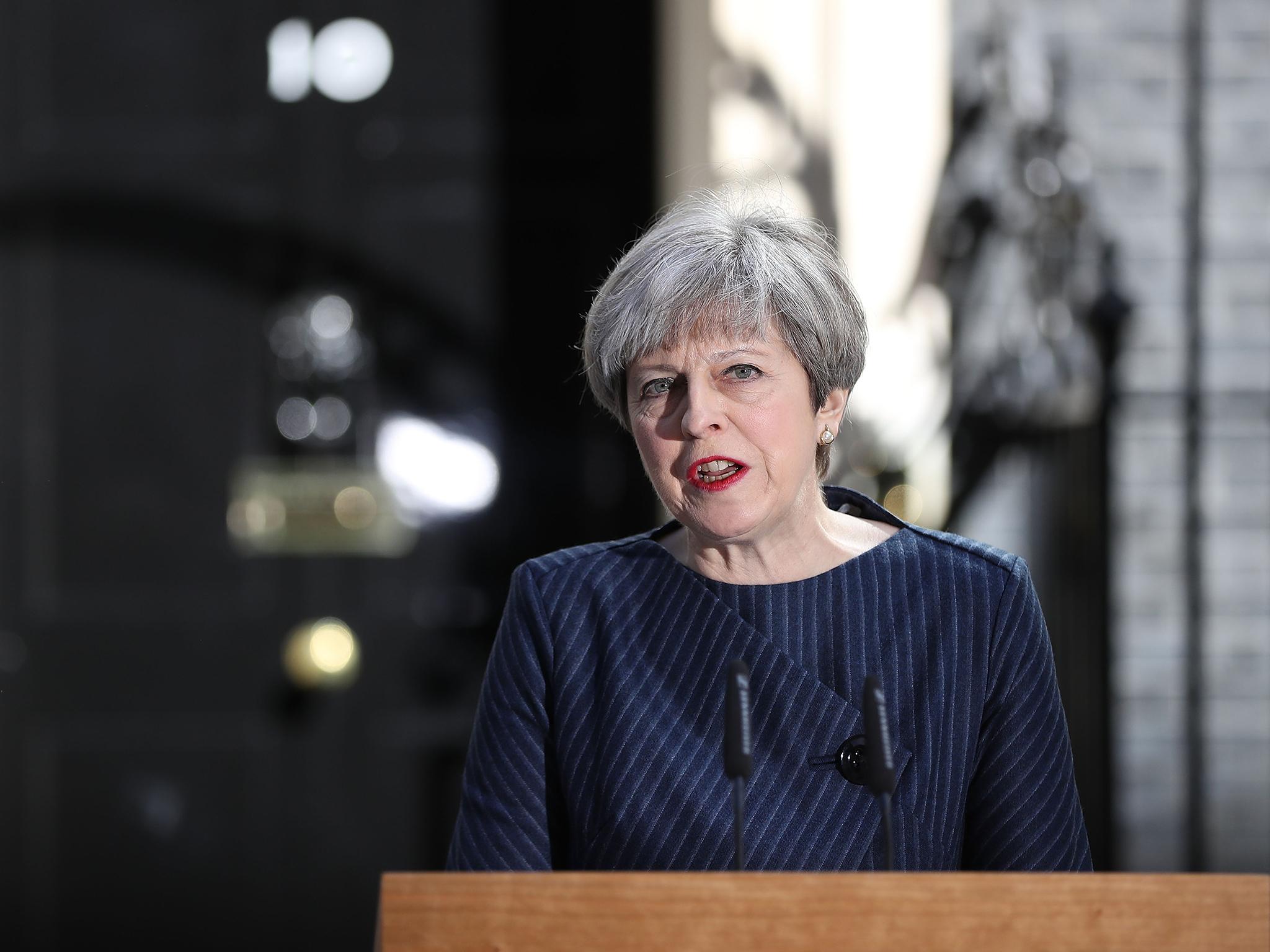
6/20 May calls snap election – 18 April 2018
Seeking a mandate for her Brexit plan, May goes to the country
Getty
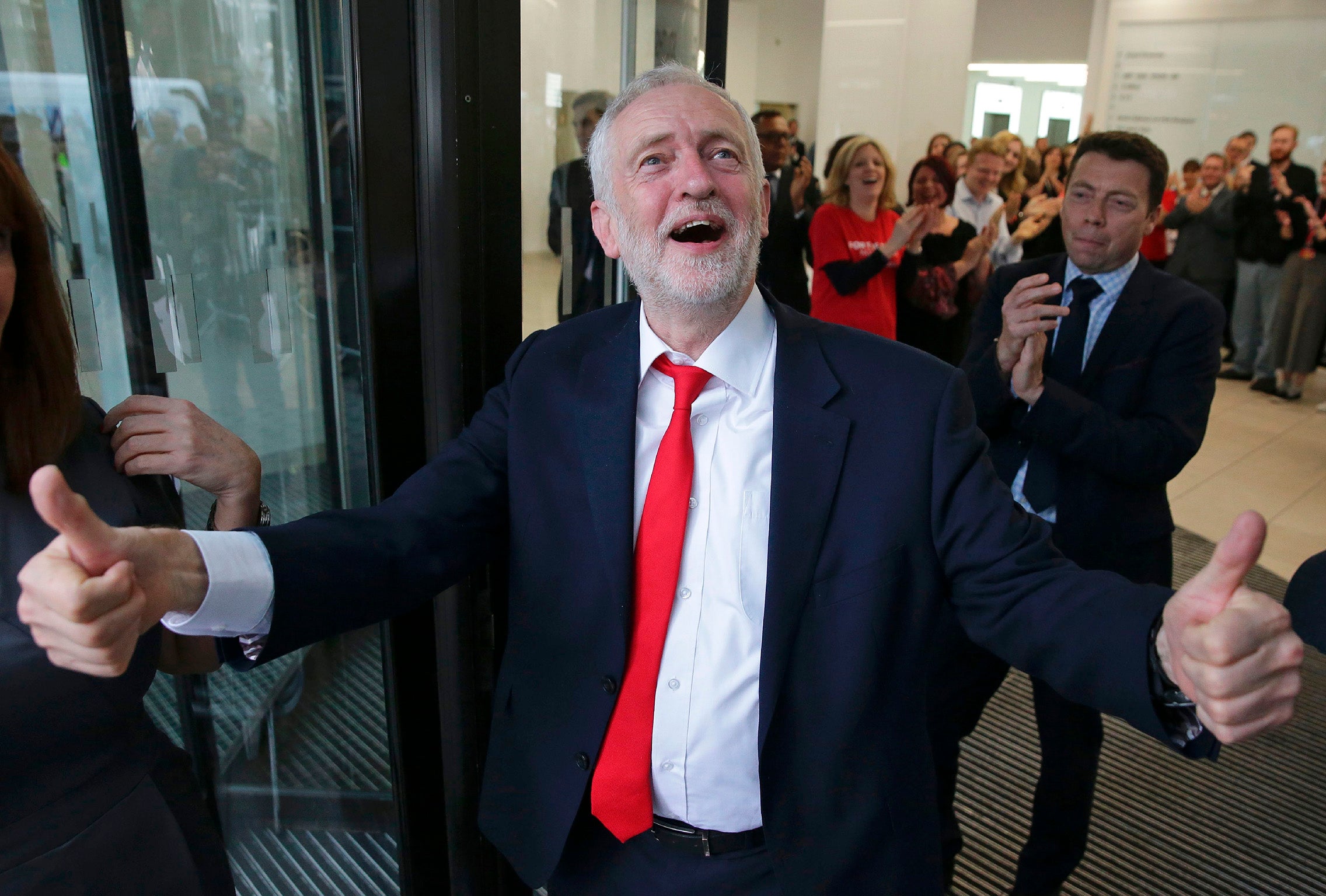
7/20 May loses majority as Labour makes surprise gain – 8 June 2017
After a disastrous campaign, Theresa May loses her majority in the commons and turns to the DUP for support. Jeremy Corbyn’s Labour party makes gains after being predicted to lose heavily
AFP/Getty
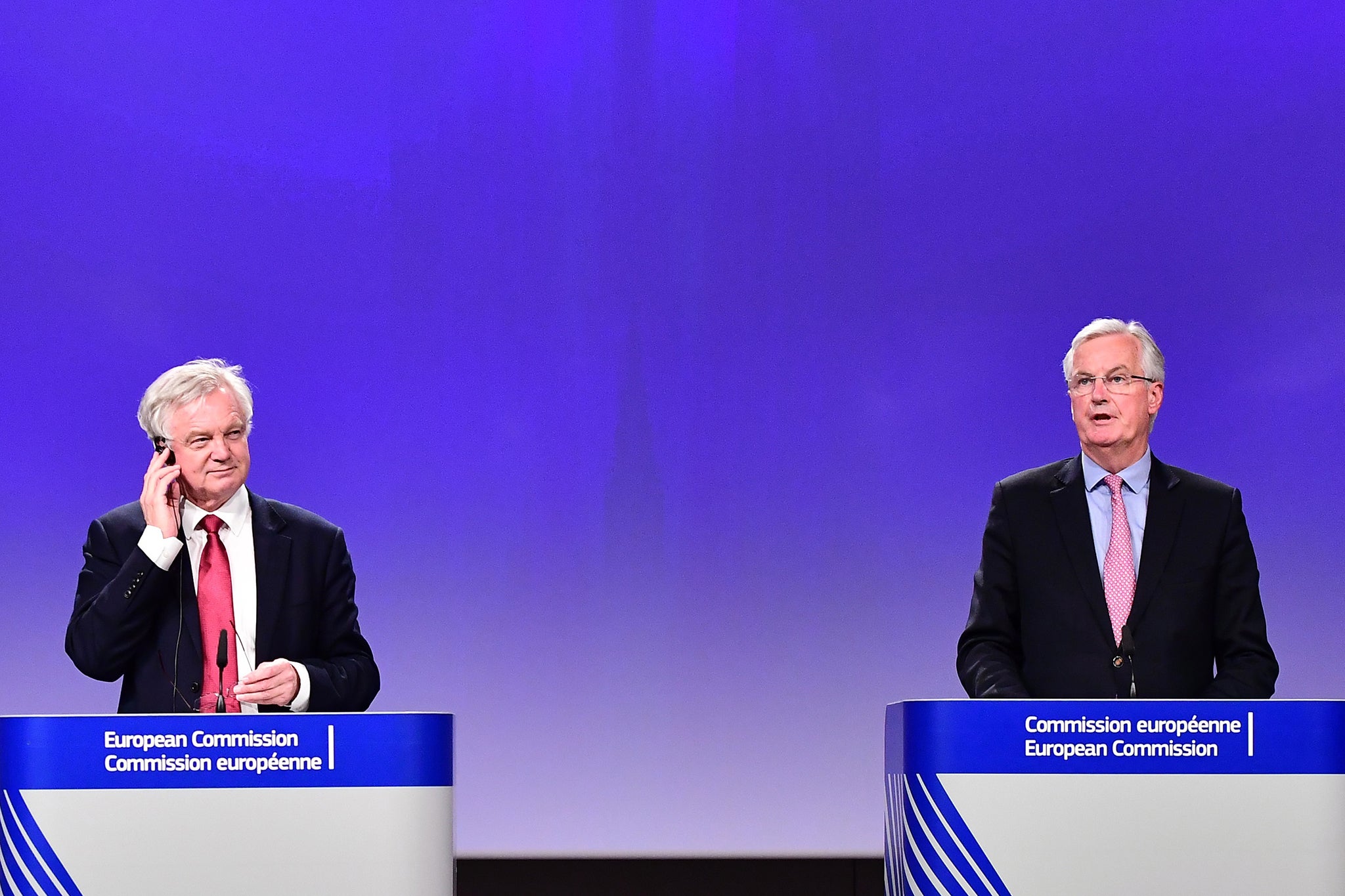
8/20 Negotiations begin – 19 June 2017
David Davis and Michel Barnier, chief negotiators for the UK and EU respectively, hold a press conference on the first day of Brexit negotiations. Soon after the beginning of negotiations, it becomes clear that the issue of the border between Northern Ireland and the Republic will prove a major sticking point
AFP/Getty
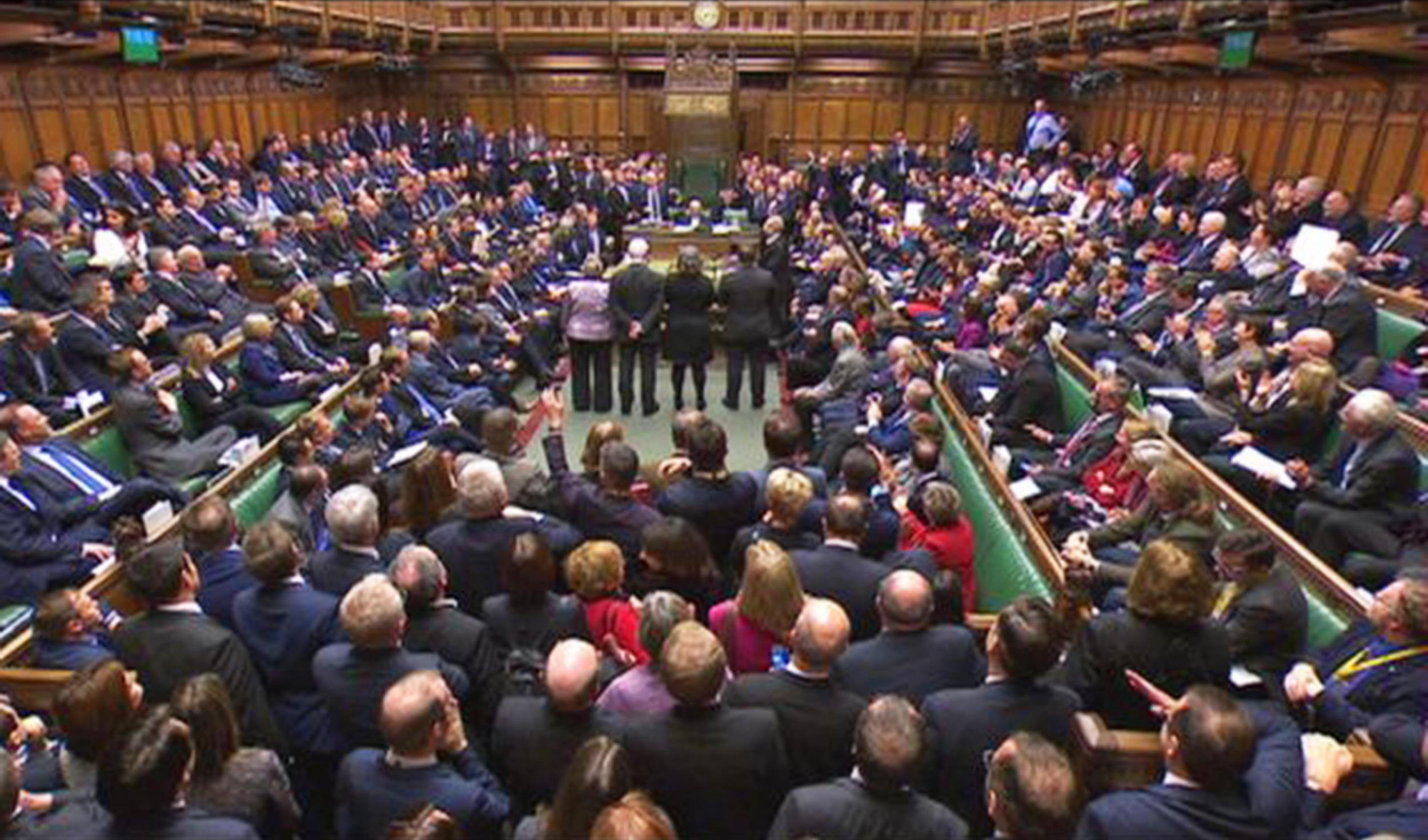
9/20 MPs vote that withdrawal deal must be ratified by parliament – 13 December 2017
The government suffers a defeat in parliament over the EU withdrawal agreement, guaranteeing that MPs are given a ‘meaningful vote’ on the deal
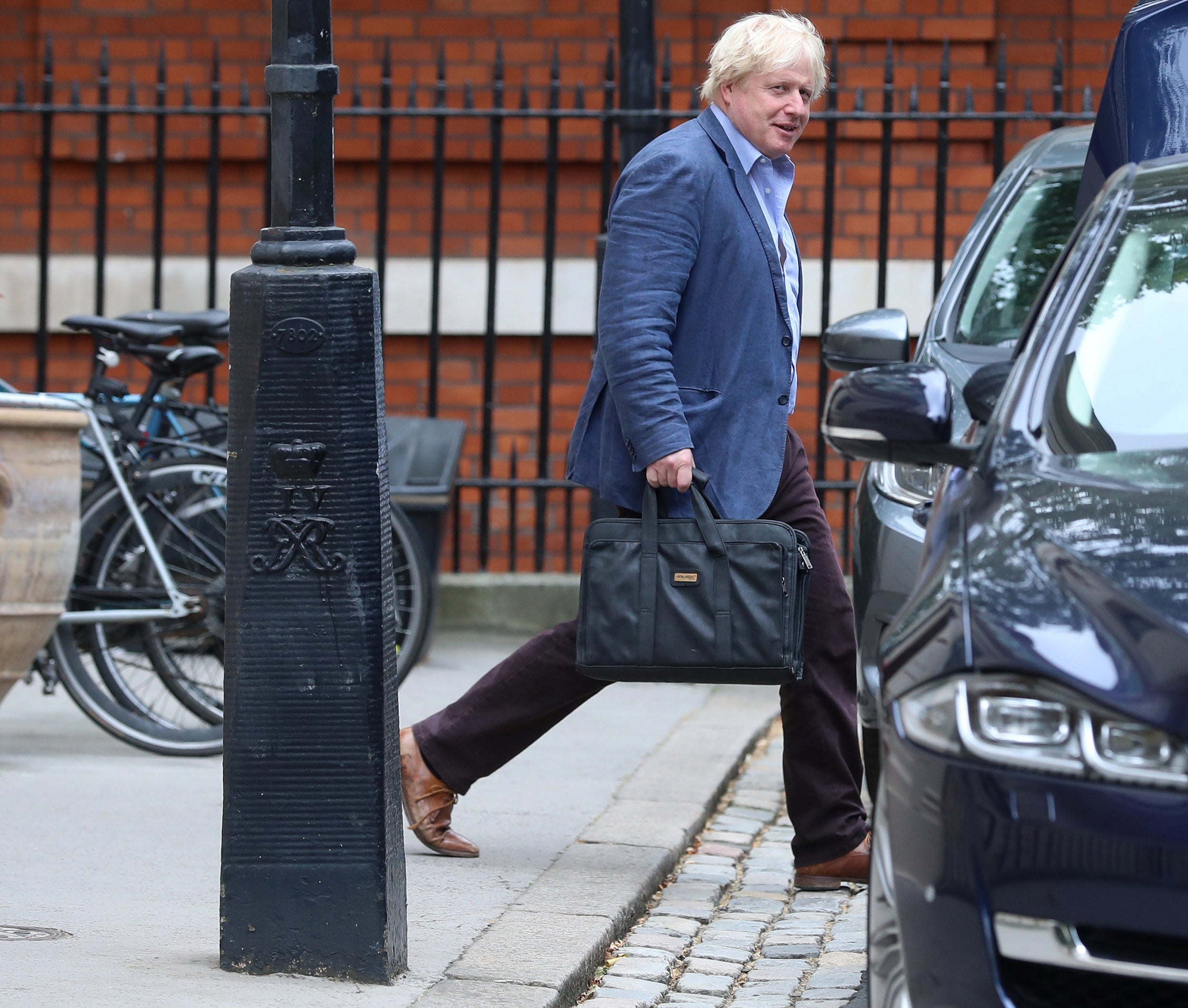
10/20 Boris Johnson resigns as foreign secretary – 11 July 2018
Following a summit at Chequers where the prime minister claimed to have gained cabinet support for her deal, Boris Johnson resigns as foreign secretary along with David Davis, the Brexit secretary
Reuters
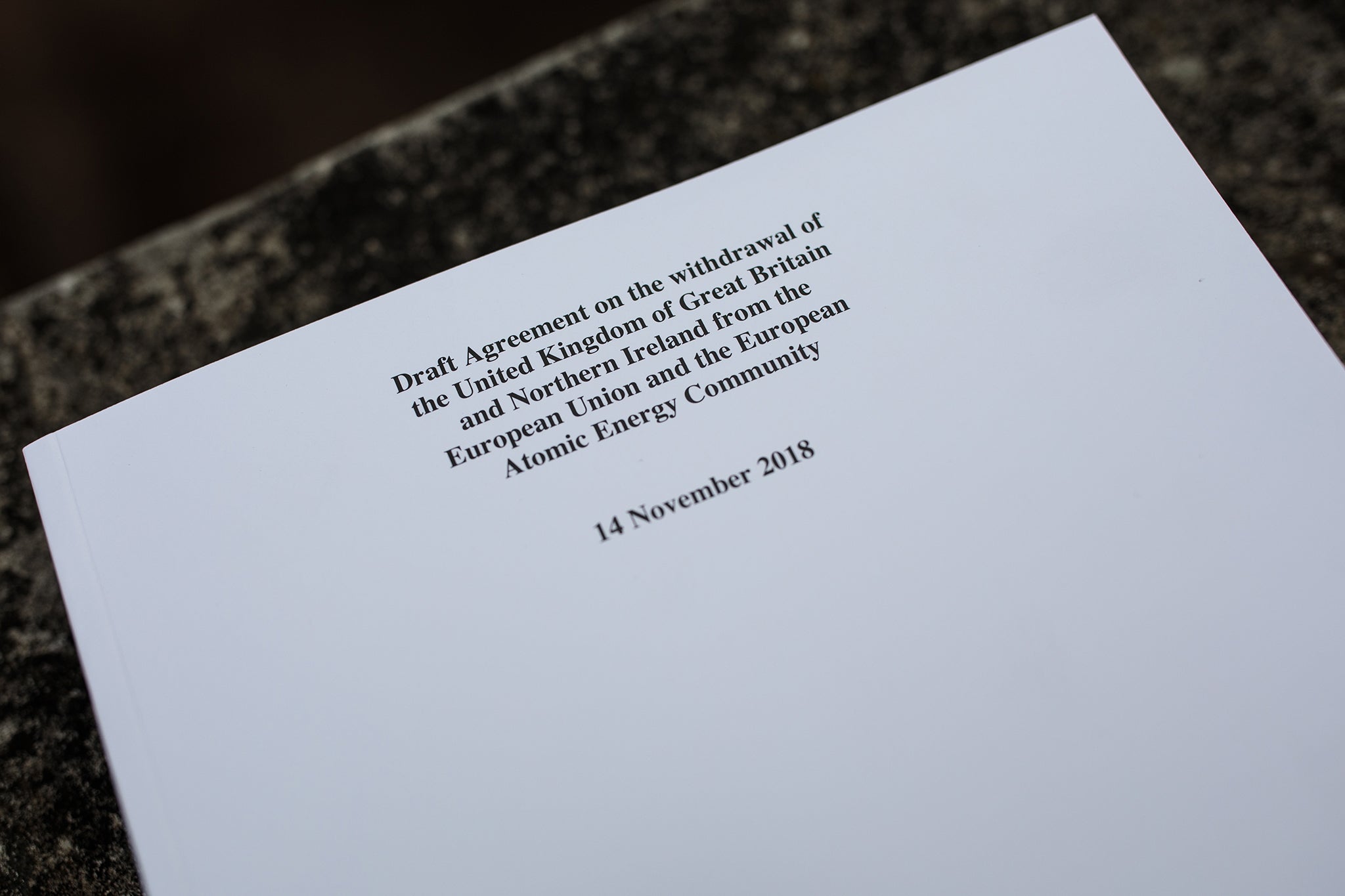
11/20 Draft withdrawal agreement – 15 November 2018
The draft withdrawal agreement settles Britain’s divorce bill, secures the rights of EU citizens living in the UK and vice versa and includes a political declaration commiting both parties to frictionless trade in goods and cooperation on security matters. The deal also includes the backstop, which is anathema to many brexiteers and Dominic Raab and Esther McVey resign from the cabinet in protest
Getty
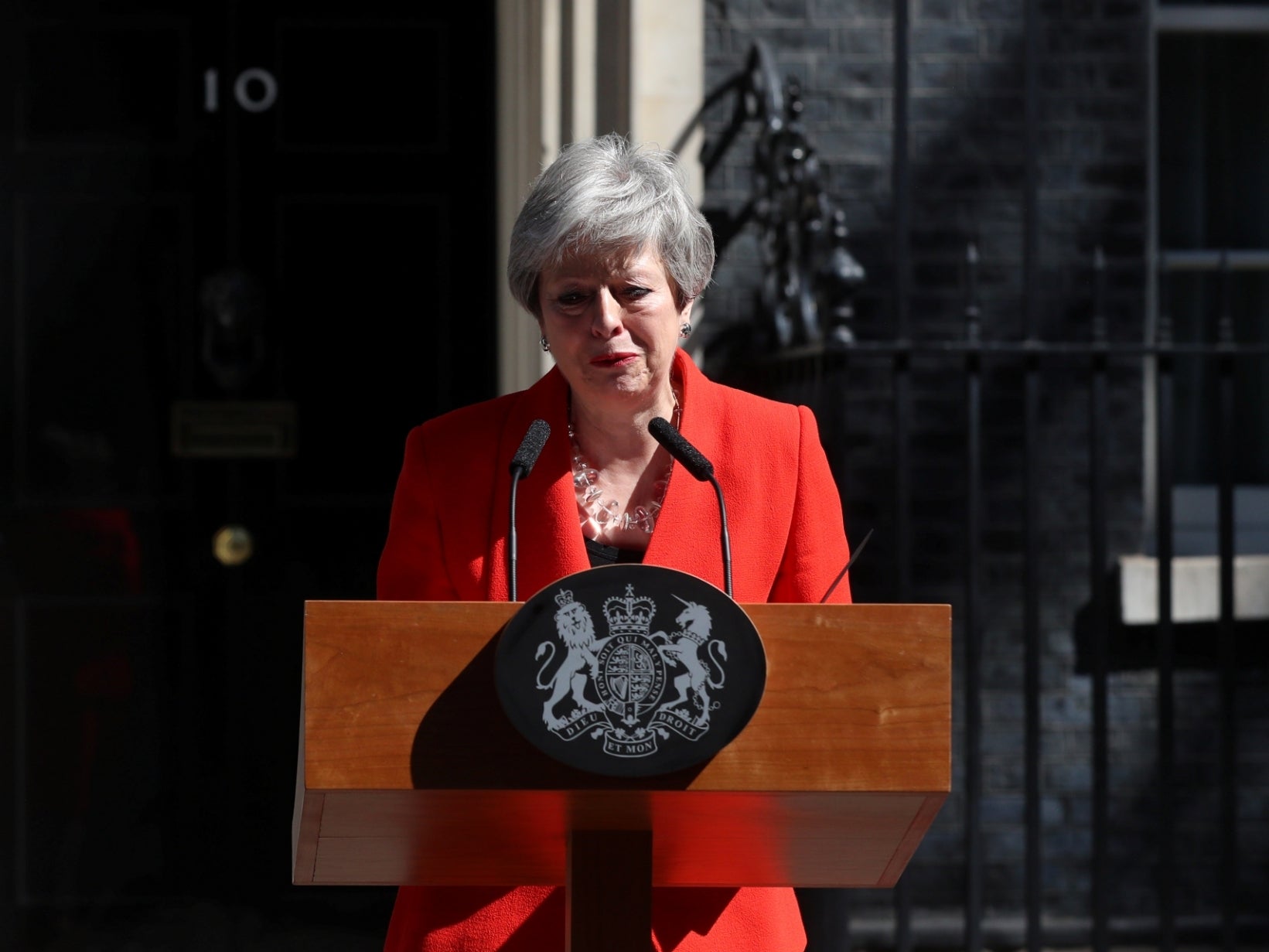
12/20 May resigns – 24 May 2019
After several failed attempts to pass her withdrawal agreement through the commons, Theresa May resigns
Reuters
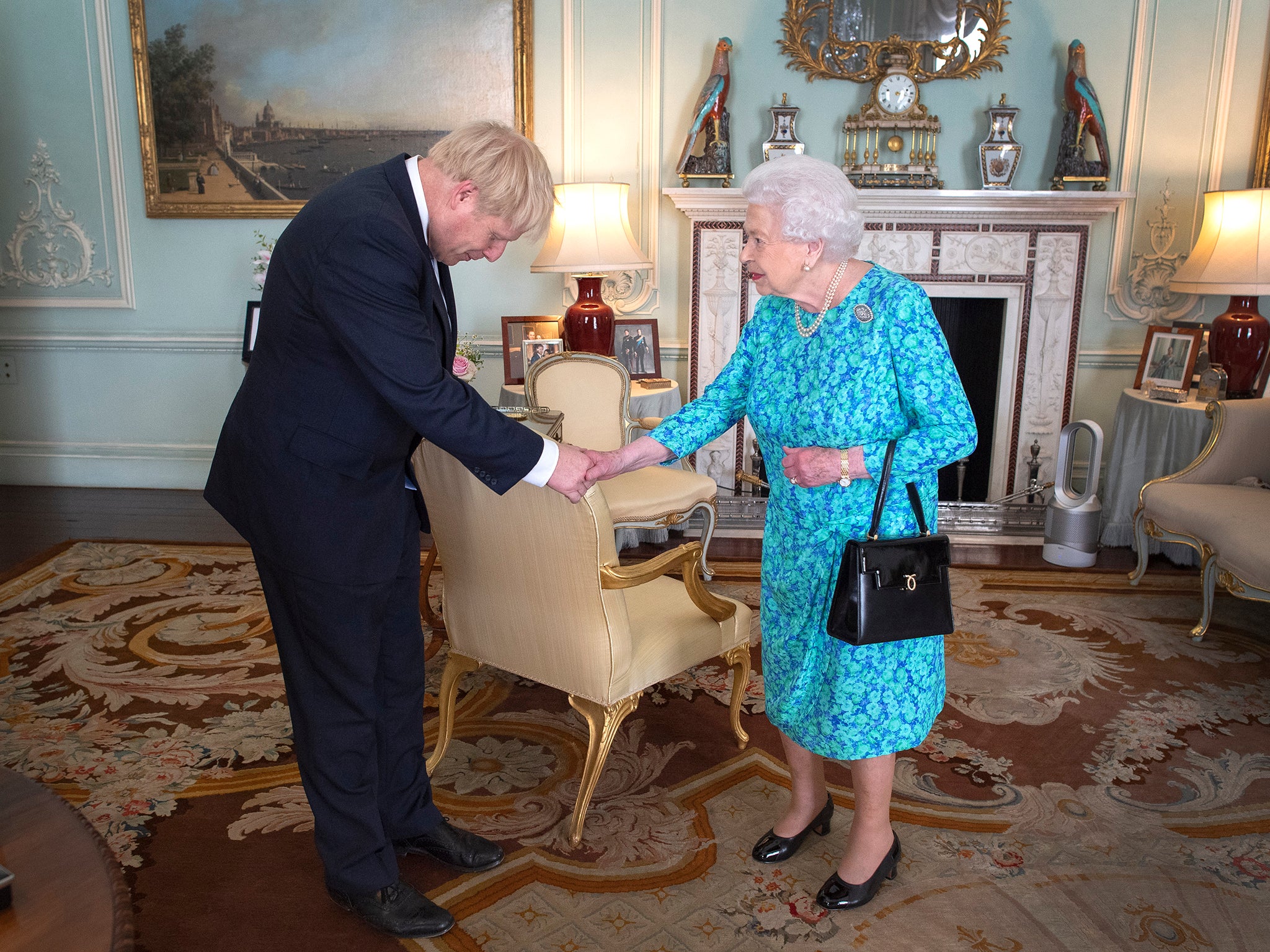
13/20 Johnson takes over – 24 July 2019
Boris Johnson is elected leader of the Conservative party in a landslide victory. He later heads to Buckingham Palace where the Queen invites him to form a government
Getty

14/20 Parliament prorogued – 28 August 2019
Boris Johnson prorogues parliament for five weeks in the lead up to the UK’s agreed departure date of 31 October.
Stephen Morgan MP
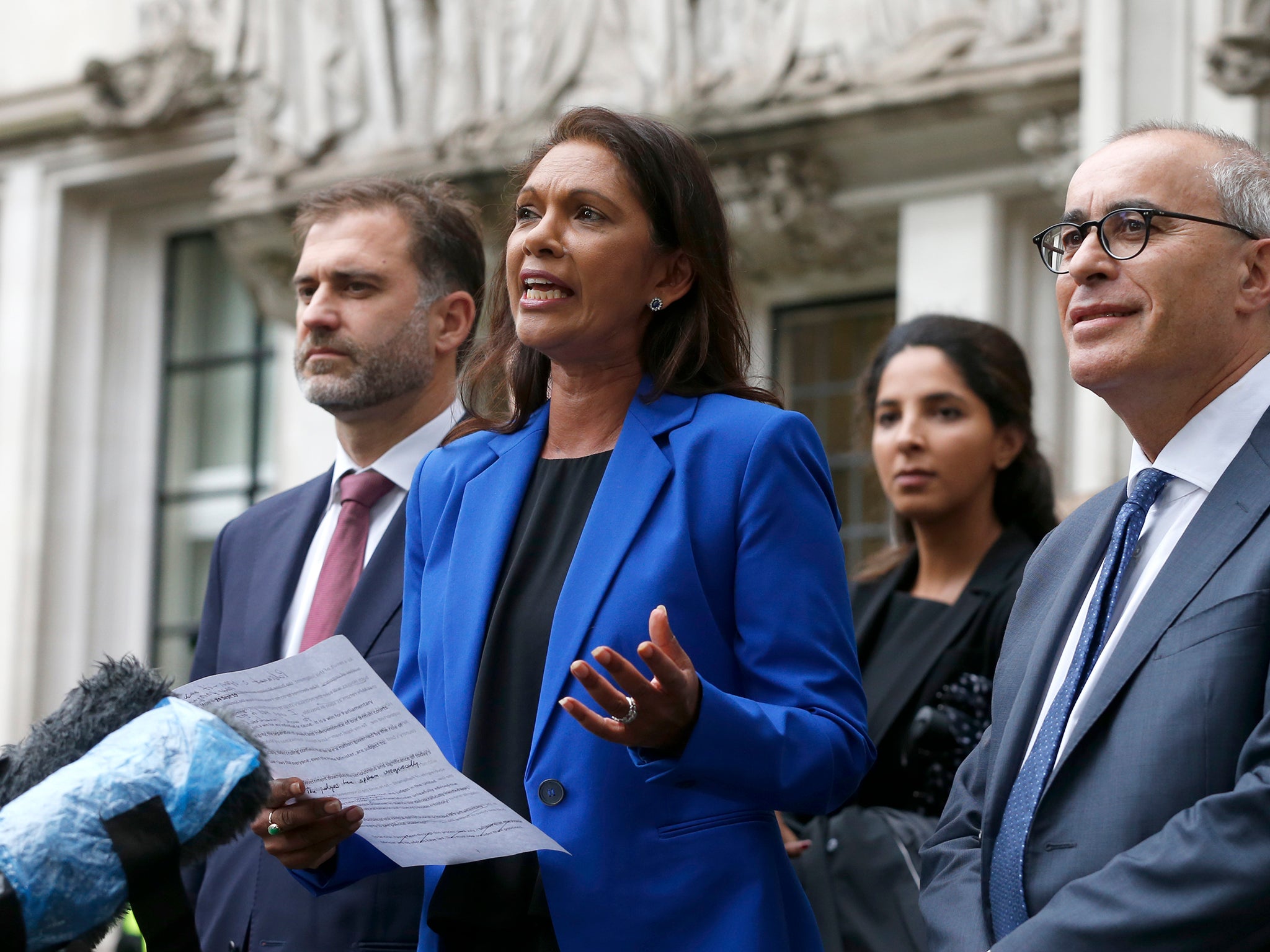
15/20 Prorogation ruled unlawful – 24 September 2019
The High Court rules that Johnson’s prorogation of parliament is ‘unlawful’ after a legal challenge brought by businesswoman Gina Miller
Getty
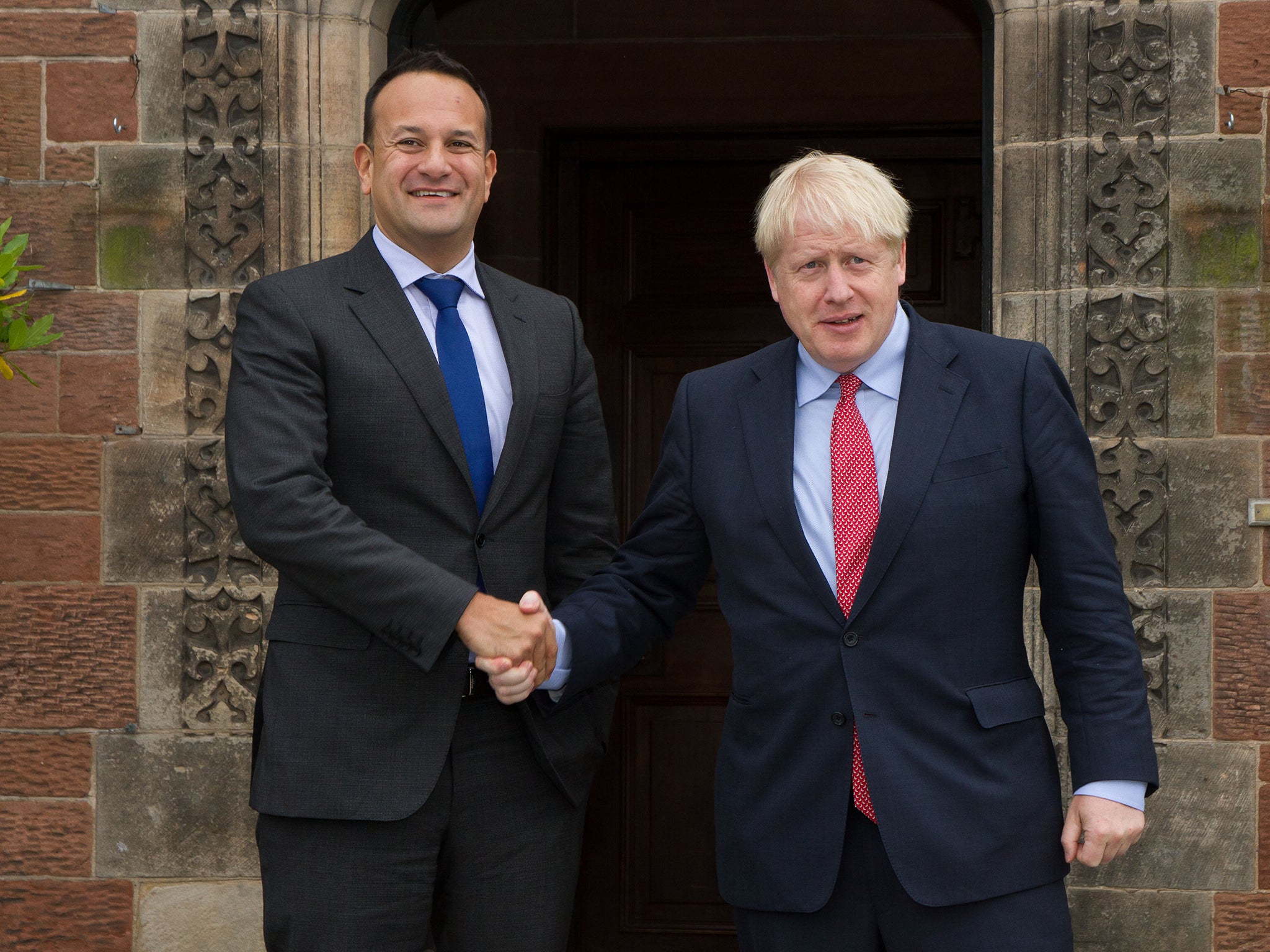
16/20 Johnson agrees deal with Varadkar – October
Following a summit in Merseyside, Johnson agrees a compromise to the backstop with Irish prime minister Leo Varadkar – making the withdrawal agreement more palatable to Brexiteers
Getty
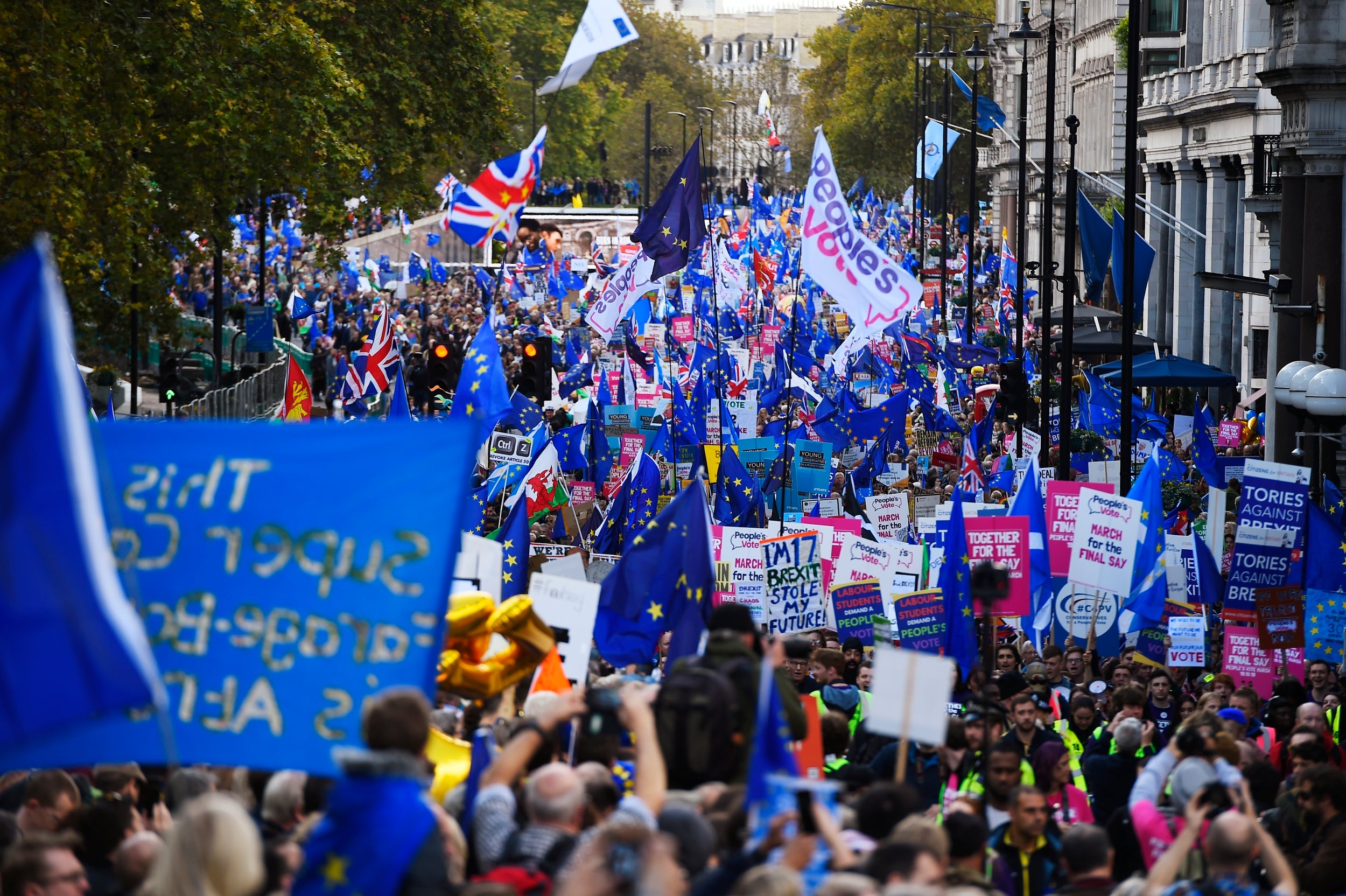
17/20 Final Say march demands second referendum – 19 October 2019
As parliament passes the Letwin amendment requiring the prime minister to request a further delay to Brexit, protesters take to the streets in the final show of force for a Final Say referendum
Getty
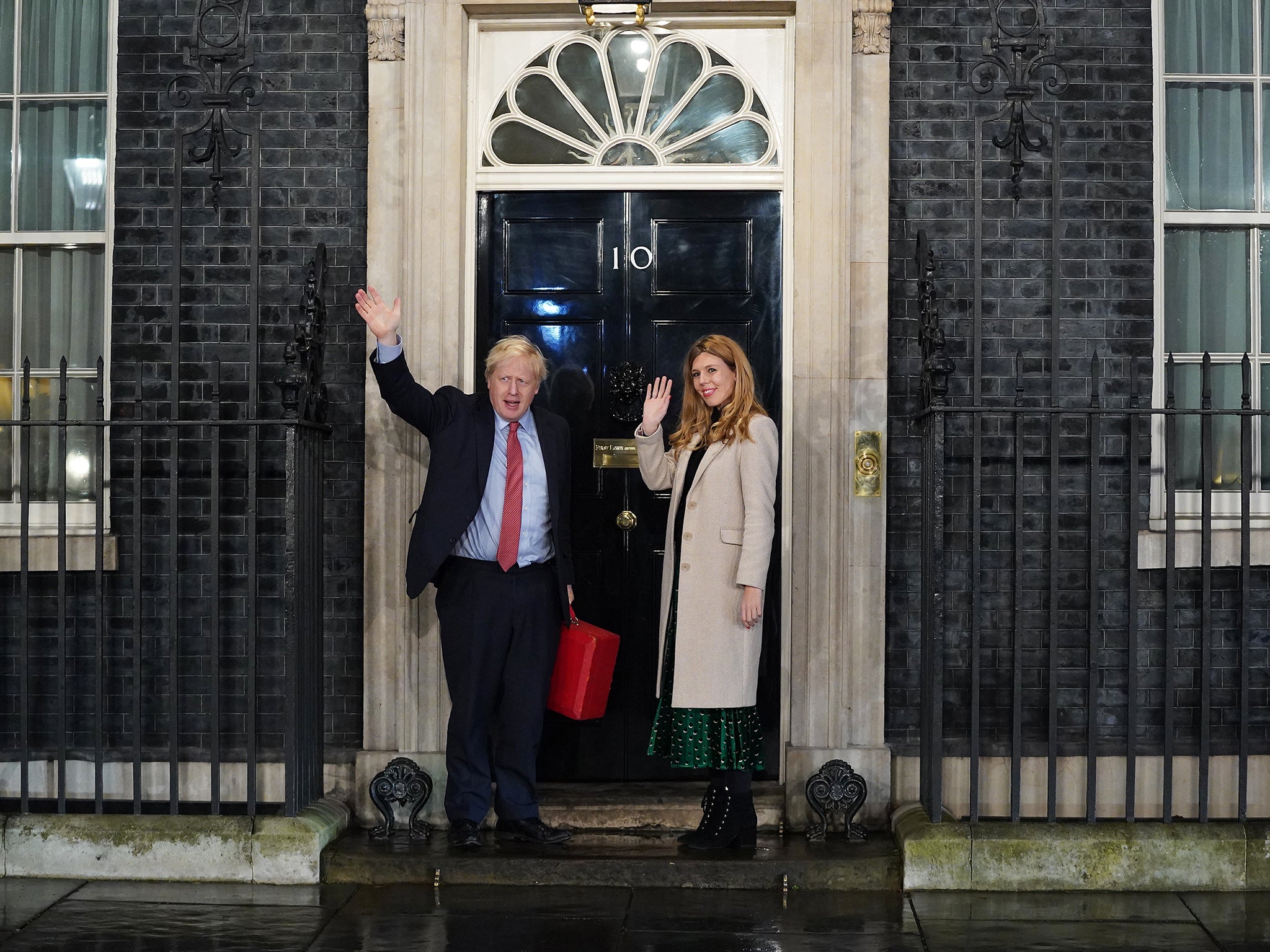
18/20 Johnson wins 80 seat majority – 12 December 2019
The Conservatives win the December election in a landslide, granting Boris Johnson a large majority to pass through his brexit deal and pursue his domestic agenda
Getty
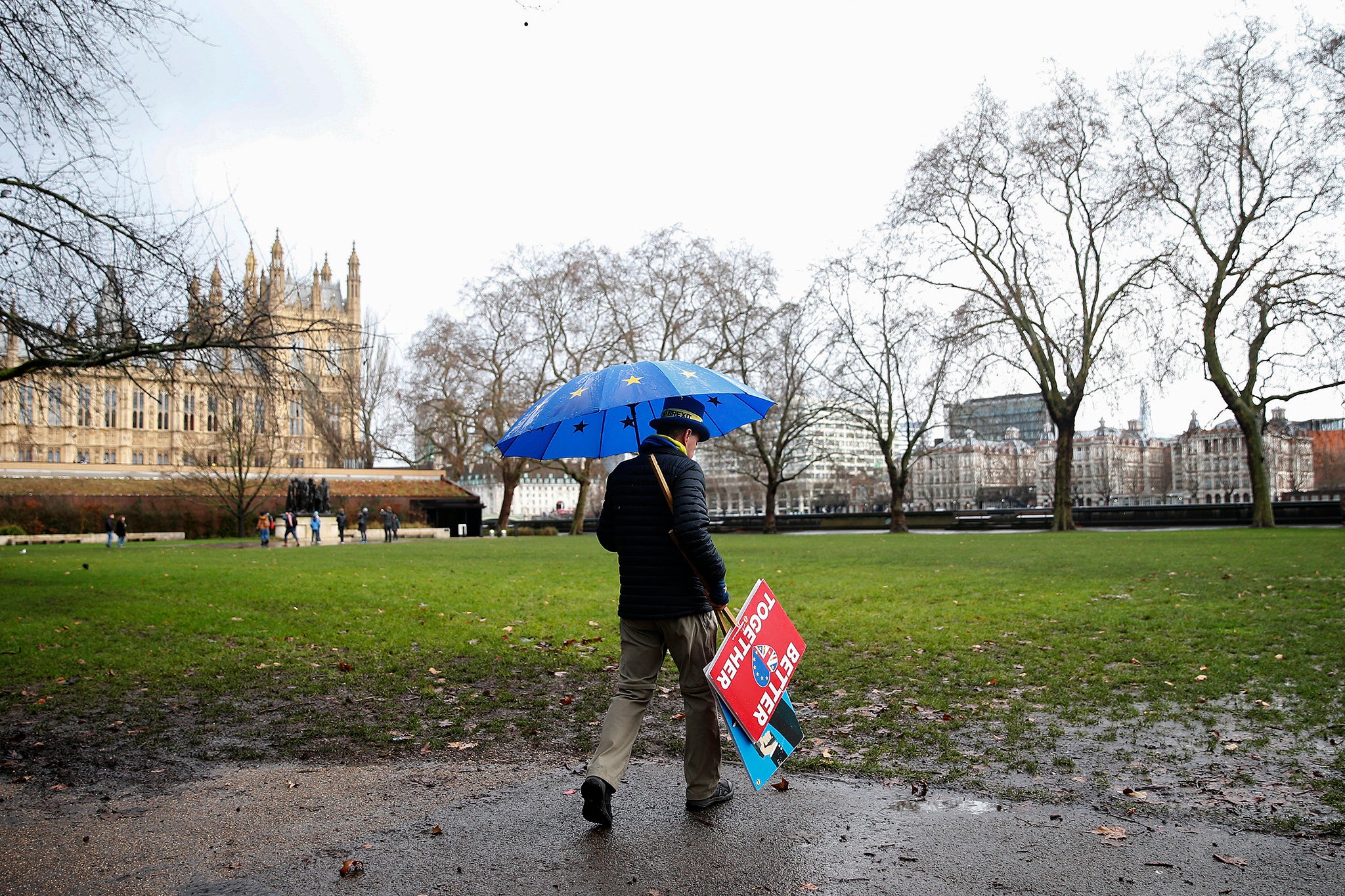
19/20 Withdrawal deal passes parliament – 20 December 2019
The withdrawal agreement passes through the commons with a majority of 124
Getty
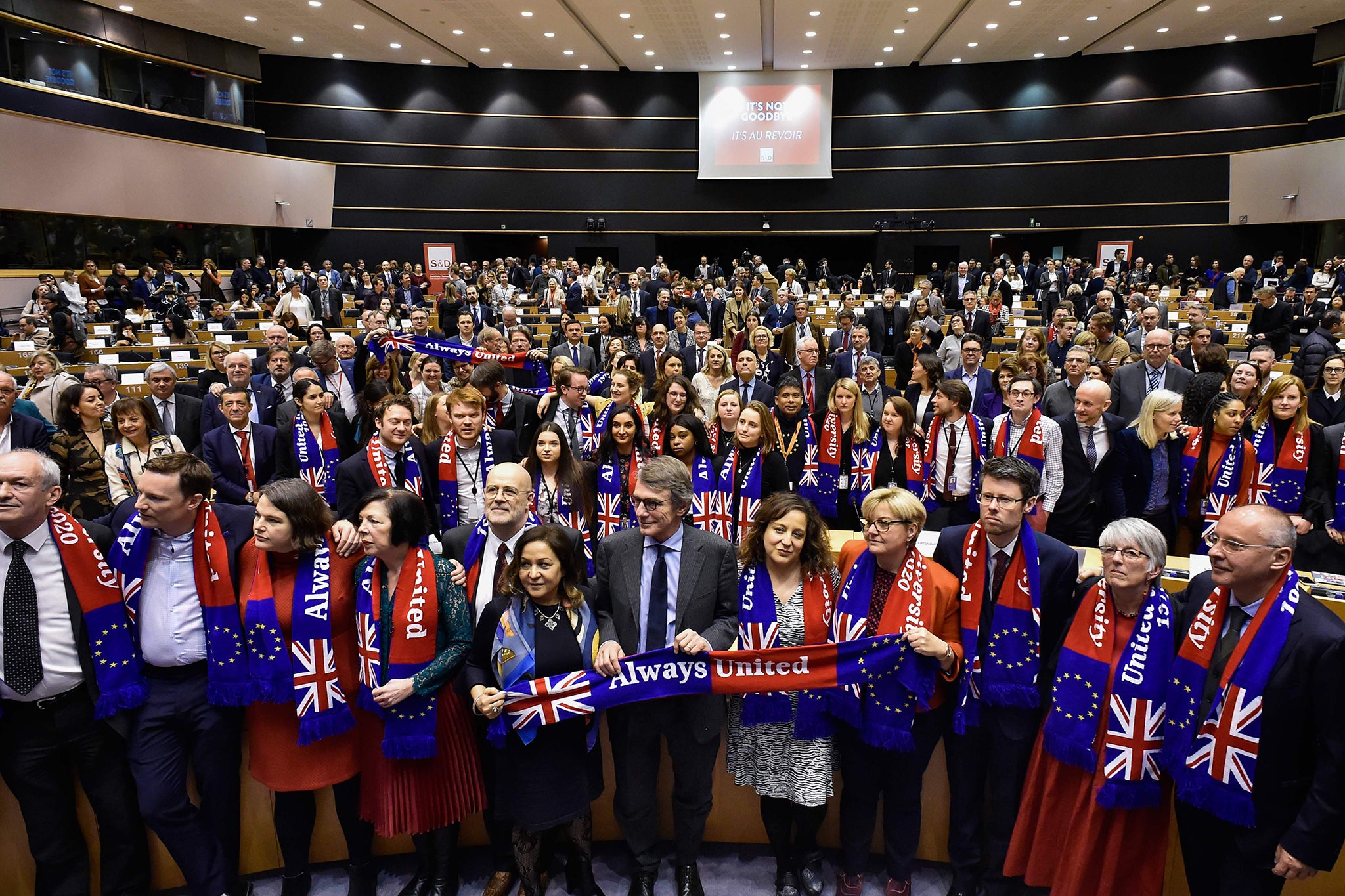
20/20 EU parliament backs UK withdrawal deal – 29 January 2020
Members of the European parliament overwhelmingly back the ratification of Britain’s departure, clearing the way for Brexit two days later on 31 January. Following the vote, members join hands and sing Auld Lang Syne
AFP/Getty

1/20 Britain votes to leave the European Union – 23 June 2016
A referendum is held on Britain’s membership of the European Union. Fifty-two per cent of the country votes in favour of leaving
AFP via Getty

2/20 David Cameron resigns – 24 June 2016
David Cameron resigns on the morning of the result after leading the campaign for Britain to remain in the EU
Getty

3/20 Theresa May takes the reins – 13 July 2016
Theresa May becomes leader of the Conservative party and prime minister, winning the leadership contest unopposed after Andrea Leadsom drops out
Getty

4/20 High Court rules parliament must vote on Brexit – November 2016 – 3 November 2016
The High Court rules that parliament must vote on triggering Article 50, which would begin the Brexit process

5/20 Article 50 triggered – 28 March 2017
The prime minister triggers Article 50 after parliament endorses the result of the referendum
Getty

6/20 May calls snap election – 18 April 2018
Seeking a mandate for her Brexit plan, May goes to the country
Getty

7/20 May loses majority as Labour makes surprise gain – 8 June 2017
After a disastrous campaign, Theresa May loses her majority in the commons and turns to the DUP for support. Jeremy Corbyn’s Labour party makes gains after being predicted to lose heavily
AFP/Getty

8/20 Negotiations begin – 19 June 2017
David Davis and Michel Barnier, chief negotiators for the UK and EU respectively, hold a press conference on the first day of Brexit negotiations. Soon after the beginning of negotiations, it becomes clear that the issue of the border between Northern Ireland and the Republic will prove a major sticking point
AFP/Getty

9/20 MPs vote that withdrawal deal must be ratified by parliament – 13 December 2017
The government suffers a defeat in parliament over the EU withdrawal agreement, guaranteeing that MPs are given a ‘meaningful vote’ on the deal

10/20 Boris Johnson resigns as foreign secretary – 11 July 2018
Following a summit at Chequers where the prime minister claimed to have gained cabinet support for her deal, Boris Johnson resigns as foreign secretary along with David Davis, the Brexit secretary
Reuters

11/20 Draft withdrawal agreement – 15 November 2018
The draft withdrawal agreement settles Britain’s divorce bill, secures the rights of EU citizens living in the UK and vice versa and includes a political declaration commiting both parties to frictionless trade in goods and cooperation on security matters. The deal also includes the backstop, which is anathema to many brexiteers and Dominic Raab and Esther McVey resign from the cabinet in protest
Getty

12/20 May resigns – 24 May 2019
After several failed attempts to pass her withdrawal agreement through the commons, Theresa May resigns
Reuters

13/20 Johnson takes over – 24 July 2019
Boris Johnson is elected leader of the Conservative party in a landslide victory. He later heads to Buckingham Palace where the Queen invites him to form a government
Getty

14/20 Parliament prorogued – 28 August 2019
Boris Johnson prorogues parliament for five weeks in the lead up to the UK’s agreed departure date of 31 October.
Stephen Morgan MP

15/20 Prorogation ruled unlawful – 24 September 2019
The High Court rules that Johnson’s prorogation of parliament is ‘unlawful’ after a legal challenge brought by businesswoman Gina Miller
Getty

16/20 Johnson agrees deal with Varadkar – October
Following a summit in Merseyside, Johnson agrees a compromise to the backstop with Irish prime minister Leo Varadkar – making the withdrawal agreement more palatable to Brexiteers
Getty

17/20 Final Say march demands second referendum – 19 October 2019
As parliament passes the Letwin amendment requiring the prime minister to request a further delay to Brexit, protesters take to the streets in the final show of force for a Final Say referendum
Getty

18/20 Johnson wins 80 seat majority – 12 December 2019
The Conservatives win the December election in a landslide, granting Boris Johnson a large majority to pass through his brexit deal and pursue his domestic agenda
Getty

19/20 Withdrawal deal passes parliament – 20 December 2019
The withdrawal agreement passes through the commons with a majority of 124
Getty

20/20 EU parliament backs UK withdrawal deal – 29 January 2020
Members of the European parliament overwhelmingly back the ratification of Britain’s departure, clearing the way for Brexit two days later on 31 January. Following the vote, members join hands and sing Auld Lang Syne
AFP/Getty
He added: “As a country we’ve been bitterly divided for three and a half years.
“Our politics has been frozen instead of tackling the real and deep-rooted problems we face.
“Now the leave-remain divide must end. Defining people by how they voted in June 2016 merely upholds a divide that we must overcome. There are no leavers or remainers any more. In 2024 there will be no leave or remain constituencies.”
Ms Long-Bailey’s endorsement from the CWU came after she had already secured her place on the final ballot alongside Sir Keir and Lisa Nandy, but is a further show of support for her campaign.
CWU generals secretary Dave Ward said: “I am proud of the democratic process our union has conducted and it is clear to me that Rebecca Long-Bailey is the outstanding candidate for leader.”
The union also backed shadow education secretary Angela Rayner for the deputy leader’s role.
Press Association


